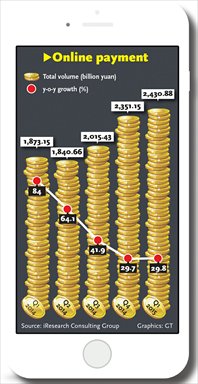
Revenue of online payment firms could be hit: analysts
New regulations for the country's fast-growing third-party payment sector will not cause much inconvenience for individual consumers, the central bank said Saturday, after it announced a draft set of tightened rules and sought public opinion on them on Friday.
However, the tightened rules could pose a threat to the current business model of most third-party payment firms and could dampen their revenues, analysts said.
In a proposal released on Friday, the People's Bank of China (PBC), the country's central bank, said that individuals could spend no more than 5,000 yuan ($805) from a third-party payment account in one day. And the cap will be reduced to 1,000 yuan for less secure transaction processes.
Users can negotiate with third-party payment providers to get potentially higher daily limits, but only if they provide more information to guarantee the security of each transaction, according to the proposal.
The PBC also proposed annual caps for the amount of money that can be spent from third-party payment accounts - 100,000 yuan for accounts that are used only for shopping payments, and 200,000 yuan for accounts that are for both shopping and investment payments.
The proposal has aroused concern among the country's Internet users, who have become used to shopping online.
Some Internet users complained that 5,000 yuan is not even enough to buy an iPhone 6.
But the PBC dismissed these concerns. When consumers need to spend more than the cap, they can use normal online bank payment services instead, the central bank told Xinhua Saturday.
The PBC further explained that the caps will not affect most consumers. In 2014, around 98.5 percent of Internet users spent less than 200,000 yuan on shopping or purchasing online wealth management products by using their third-party payment accounts, the PBC said.
The central bank also proposed tightening the registration procedures for a new third-party payment account, in a bid to ensure safety. Multiple documents would also be required to verify the user's identity.
Despite the new restrictions, Li Chao, an analyst at iResearch Consulting Group, said the new rules would bring few changes to the process of online transactions, as most consumers spend within the limit proposed by the PBC.
While consumers may feel somewhat relieved after the PBC's explanation, analysts said that the country's third-party payment firms with PBC licenses to operate - totaling around 270 so far - may feel concerned, as they will face restrictions on future operations.
The draft regulations said that third-party payment firms should not offer users services such as financing, wealth management or currency exchange, which are traditionally provided by banks.
The PBC also said that e-commerce firms should not prevent consumers from using payment tools provided by rival firms.
Under the new rules, analysts noted that online monetary funds, which have seen rapid development in the past two years, may be affected.
One such fund, Yu'ebao, was launched by Alipay, the payment tool of Internet giant Alibaba Group, in 2013. Rival company Tencent Holdings also offers similar services.
Both companies declined to comment when contacted by the Global Times on Sunday.
"The new regulation, if eventually put into effect, could be a major hit to the income of these third-party payment companies," Yu Pingkang, chief economist at Huatai Securities, told the Global Times on Sunday.
Yu also noted that the draft regulations offer a clear definition of third-party payment firms: They can only serve as "a payment tool for small online transactions" and are not allowed to act as banks or clearing companies between banks.
"The regulation could benefit the sector's long-term development," Yu said.
Despite the potential downsides, Li from iResearch said that the new regulations would have little impact on the user base of online payment firms.
"They may get less money, but not less users," he said.
"I will continue to use Alipay as long as it is still convenient," Li Shanshan, a Beijing-based white-collar worker, told the Global Times on Sunday.


















































